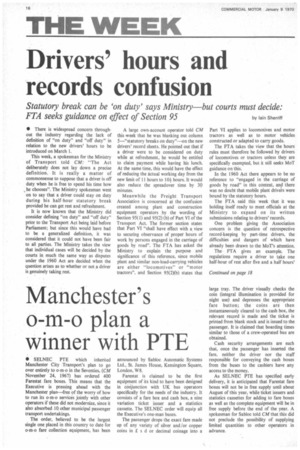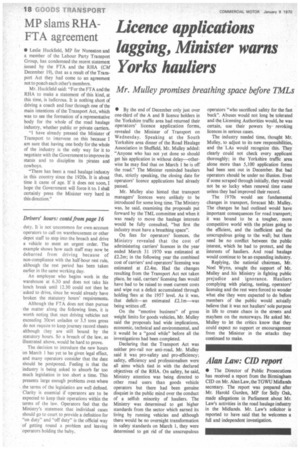Drivers' hours and records confusion
Page 22

Page 24

If you've noticed an error in this article please click here to report it so we can fix it.
Statutory break can be 'on duty' says Ministry—but courts must decide:
FTA seeks guidance on effect of Section 95 by lain Sherriff
• There is widespread concern throughout the industry regarding the lack of definition of "on duty" and "off duty" in relation to the new drivers' hours to be introduced on March 1.
This week, a spokesman for the Ministry of Transport told CM: "The Act deliberately does not lay down a precise definition. It is really a matter of commonsense to suppose that a driver is off duty when he is free to spend his time how , he chooses". The Ministry spokesman went on to say that a driver could stay on duty during his half hour statutory break provided he can get rest and refreshment.
It is now known that the Ministry did consider defining "on duty" and -off duty" prior to the Transport Act being laid before Parliament; but since this would have had to be a generalized definition, it was considered that it could not have been fair to all parties. The Ministry takes the view that individual cases will be decided by the courts in much the same way as disputes under the 1960 Act are decided when the question arises as to whether or not a driver is genuinely taking rest.
A large own-account operator told CM this .week that he was blanking out column 5—"statutory breaks on duty"—on the new drivers' record sheets. He pointed out that if a driver were to be considered on duty while at refreshment, he would be entitled to claim payment while having his lunch. At the same time, this would have the effect of reducing the actual working day from the new limit of 11 hours to 10+ hours. It would also reduce the spreadover time by 30 minutes.
Meanwhile the Freight Transport Association is concerned at the confusion created among plant and construction equipment operators by the wording of Section 95(1) and 95(2) (b) of Part VI of the Transport Act. The former section states that Part VI "shall have effect with a_ view to securing observance of proper hours of work by persons engaged in the carriage of goods by road". The FTA has asked the Ministry to explain the purpose and significance of this reference, since mobile plant and similar non-load-carrying vehicles are either "locomotives" or "motor tractors-. and Section 95(2Xb) states that
Part VI applies to locomotives and motor tractors as well as to motor vehicles constructed or adapted to carry goods.
The FTA takes the view that the hours rules must therefore be followed by drivers of locomotives or tractors unless they are specifically exempted, but it still seeks MoT guidance on this.
In the 1960 Act there appears to be no reference to -engaged in the carriage of goods by road" in this context. and there was no doubt that mobile plant drivers were bound by the statutory hours.
The FTA said this week that it was holding itself ready to meet officials at the Ministry to expand on its written submissions relating to drivers' records.
One problem giving the Association concern is the question of retrospective record-keeping by part-time drivers, the difficulties and dangers of which have already been drawn to the MoT's attention.
The FTA gives an example. The regulations require a driver to take one half-hour of rest after five and a half hours' duty. It is not uncommon for own-account operators to call on warehousemen or other depot staff to step into the breach and drive a vehicle to meet an urgent order. The example shows how such staff may now be debarred from driving because of non-compliance with the half-hour rest rule, although the rest period has been taken earlier in the same working day.
An employee who begins work in the warehouse at 6.30 and does not take his lunch break until 12.30 could not then be asked to drive, since he would already have broken the statutory hours' requirements.
Although the FTA does not then pursue the matter along the following lines, it is worth noting that men driving vehicles not exceeding 30cwt unladen or 3.5 tons gross do not require to keep journey record sheets although they are still bound by the statutory hours. So a breach of the law, as illustrated above, would be hard to prove.
The decision to introduce the new hours on March 1 has yet to be given legal effect, and many operators consider that the date should be postponed. Feeling is that the industry is being asked to absorb far too much legislation in too short a time. This presents large enough problems even where the terms of the legislation are well defined. Clarity is essential if operators are to be expected to keep their operations within the terms of the law. Operators feel that the Ministry's statement that individual cases should go to court to provide a definition for "on duty" and "off duty" is the official way of getting round a problem and leaving operators holding the baby.








































































































